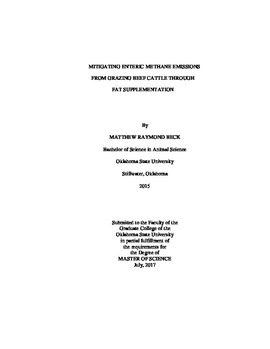| dc.contributor.advisor | Reuter, Richard R. | |
| dc.contributor.author | Beck, Matthew Raymond | |
| dc.date.accessioned | 2018-06-08T19:57:52Z | |
| dc.date.available | 2018-06-08T19:57:52Z | |
| dc.date.issued | 2017-07-01 | |
| dc.identifier.uri | https://hdl.handle.net/11244/300016 | |
| dc.description.abstract | Ruminant animals produce a significant amount of the greenhouse gases that contribute to climate change, with the majority of emissions arising from grazing ruminant systems. Chief among these gases is methane which arises as a byproduct of ruminal fermentation. Enteric methane also represents a significant energy waste to the animal. Due to these negative implications of enteric methane production it is important to identify and examine potential mitigation options for grazing ruminants. A potential option for reducing methane emissions in grazing systems is to supplement feedstuffs that are high in lipid content. These supplements have reduced methane emissions in cattle fed total mixed diets, but have not been examined in grazing system. Therefore, the objective of the experiment described in chapter II is to determine how whole cottonseed (approximately 19% fat) affects animal performance and methane emissions by grazing beef steers. In Chapter II, average daily gain increased linearly as the amount of whole cottonseed consumed increased. Determined that daily methane production and methane emission intensity (g of methane/kg of gain) had a quadratic relationship to whole cottonseed intake. Minimum daily methane production and emission intensity was found at 1.86 and 2 kg of whole cottonseed intake per day, respectively. Another aspect of fat supplements that could influence the emission mitigation potential is the physical form of the supplements. This possibility was examined (Chapter III) by offering cattle either no fat supplement (control), whole cottonseed, a supplement containing soybean oil, or a supplement containing bypass fat. In this experiment, whole cottonseed reduced daily methane production (g of methane/head/d) compared to the control, while no other treatments differed from the control. It was also found that the bypass and soybean oil treatments improved average daily gain compared to the whole cottonseed and control treatments. These effects resulted in decreased emission intensity for all supplemented treatments compared to the control. | |
| dc.format | application/pdf | |
| dc.language | en_US | |
| dc.rights | Copyright is held by the author who has granted the Oklahoma State University Library the non-exclusive right to share this material in its institutional repository. Contact Digital Library Services at lib-dls@okstate.edu or 405-744-9161 for the permission policy on the use, reproduction or distribution of this material. | |
| dc.title | Mitigating Enteric Methane Emissions from Grazing Beef Cattle Through Fat Supplementation | |
| dc.contributor.committeeMember | Gunter, Stacey A. | |
| dc.contributor.committeeMember | Place, Sara E. | |
| dc.contributor.committeeMember | Horn, Gerald W. | |
| osu.filename | Beck_okstate_0664M_15332.pdf | |
| osu.accesstype | Open Access | |
| dc.description.department | Animal Science | |
| dc.type.genre | Thesis | |
| dc.type.material | text | |
